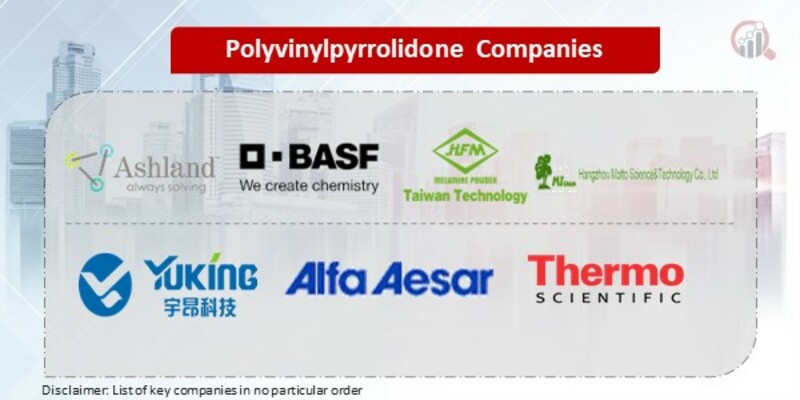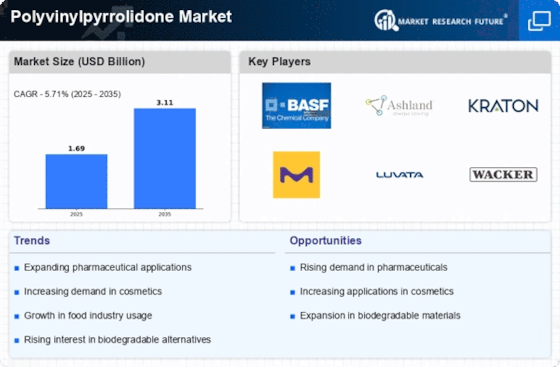Top Industry Leaders in the Polyvinylpyrrolidone Market

Polyvinylpyrrolidone, popularly known as PVP, is a versatile synthetic polymer finding its way into diverse industries, from pharmaceuticals and cosmetics to adhesives and food. Its unique properties like solubility, biocompatibility, and film-forming ability are driving its market. But who are the key players dominating this dynamic space, and what strategies are shaping the competitive landscape?
Market Share Movers and Shakers:
- Chemical Giants: Leading the pack are established chemical companies like BASF SE, Ashland Inc., and Evonik Industries. They leverage their strong production capacities, vast distribution networks, and extensive product portfolios to cater to diverse customer needs across varied application segments.
- Pharmaceutical Players: Companies like BASF SE, Albemarle Corporation, and Ashland Inc. hold significant market share in the pharmaceutical segment, supplying high-grade medical PVP for applications like tablet binders, blood expanders, and drug stabilizers. They rely on stringent quality control measures and regulatory compliance to cater to this sensitive sector.
- Adhesive Specialists: Henkel AG & Co. KGaA, H.B. Fuller Company, and Sika AG hold a strong grip on the adhesives segment, utilizing PVP's film-forming and binding properties in sealants, coatings, and construction adhesives. They focus on developing innovative PVP-based formulations with improved performance and environmental sustainability.
- Emerging Challengers: Smaller players like Zhejiang Xinde Pharm Co., Ltd., and Shandong Jining Huatai Pharmaceutical Co., Ltd., are emerging from China and India, offering cost-competitive PVP options. They target specific application segments or regions to gain market share.
Strategies for PVP Market Dominance:
- Product Diversification: Players are developing specialized PVP grades with tailored molecular weights and properties for specific applications. This caters to niche markets and enhances customer satisfaction.
- Focus on Innovation: Research and development efforts are key, with companies exploring novel applications for PVP in areas like electronics, agriculture, and water treatment. This expands market reach and unlocks new growth opportunities.
- Sustainability Initiatives: Concerns about environmental impact are driving adoption of sustainable manufacturing practices. Efficient resource utilization, reduced waste generation, and green solvents are becoming crucial differentiators.
- Regional Expansion: Emerging markets like Asia-Pacific and Latin America offer vast potential for PVP consumption. Players are establishing local production facilities, building partnerships, and adapting their offerings to regional needs.
- Vertical Integration: Some companies are integrating upstream and downstream, securing raw materials and expanding into finished product segments to gain greater control over the supply chain and profit margins.
Key Player:
-
Ashland (U.S.)
-
BASF SE (Germany)
-
Zhangzhou HuaFu Chemical Co. Ltd. (China)
-
Hangzhou Motto Science & Technology Co. Ltd. (China)
-
Shanghai Yuking Water Soluble Material Tech Co. Ltd (China)
-
Alfa Aesar
-
Thermo Fisher Scientific (U.S.)
Recent Developments:
- September 2023: Regulatory pressure intensifies in some regions regarding residual solvents in PVP, prompting manufacturers to adopt stricter purification processes.
- October 2023: Growing adoption of PVP in medical devices like contact lenses and wound dressings, leveraging its biocompatibility and film-forming properties.
- November 2023: Collaboration between PVP manufacturers and research institutions accelerates to develop next-generation applications in electronics and biomaterials.
- December 2023: Concerns emerge about price volatility in the raw materials used for PVP production, impacting product cost and potentially affecting market dynamics.










